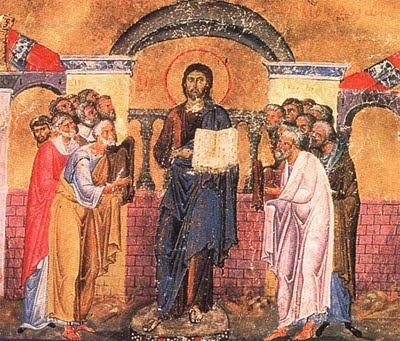1186. That 'Asshur' is reasoning is clear from the meaning of 'Asshur' or Assyria in the Word, where in every case it stands for those things that belong to reason. It stands for them in both senses, namely for rational things and for reasonings - reason and rational things being used strictly speaking to mean things that are true, and reasoning and reasonings to mean those that are false. Because 'Asshur' means reason and reasoning it is very frequently linked with Egypt, which means facts, for reason and reasoning are based on facts. That Asshur means reasoning is clear in Isaiah,
Woe to Asshur, the rod of My anger, he does not think what is right and his heart does not consider what is right He has said, By the strength of my hand I have done it, and by my wisdom, for I have intelligence. Isaiah 10:5, 7, 13.
Here 'Asshur' stands for reasoning, and therefore he is referred to as 'not thinking and not considering what is right', and it is said that 'he acts by his own wisdom, for he has intelligence'.
[2] In Ezekiel,
Two women, the daughters of one mother, committed whoredom in Egypt. In their youth they committed whoredom. One committed whoredom and doted on her lovers, on Asshur (the Assyrians), her neighbours, clothed in violet, leaders and governors, all of them desirable young men, horsemen riding on horses The sons of Babel came to her and they defiled her with their whoredom. Ezekiel 23:2-3, 5-6, 17.
Here 'Egypt' stands for facts, 'Asshur' for reasoning, 'the sons of Babel' for falsities springing from evil desires.
[3] In the same prophet,
Jerusalem, you committed whoredom with the sons of Egypt, you committed whoredom with the sons of Asshur, you multiplied your whoredom even into the land of Canaan towards Chaldaea. Ezekiel 16:26, 28-29.
Here likewise 'Egypt' stands for facts, 'Asshur' for reasoning. Reasoning, based on facts, concerning spiritual and celestial things is called 'whoredom' both here and elsewhere in the Word. Anyone may see that committing whoredom with Egyptians and with Assyrians is not the meaning.
[4] In Jeremiah,
Israel, what have you to do with the way to Egypt, to drink the waters of Shihor? And what have you to do with the way to Asshur, to drink the waters of the River (the Euphrates)? Jeremiah 2:18, 36.
Here likewise 'Egypt' stands for facts, 'Asshur' for reasoning. In the same prophet,
Israel is a scattered flock; the lions have driven him away. First the king of Asshur has devoured him, and last this king of Babel has removed his bones. Jeremiah 50:17-18
'Asshur' stands for reasoning concerning spiritual things.
[5] In Micah,
And this will be peace, when Asshur comes into our land and when he treads our palaces, and we will set up over him seven shepherds and eight princes of men and they will rule the land of Asshur with the sword, and the land of Nimrod in its gates; and he will deliver [us] from Asshur when he comes into our land and when he treads our border. Micah 5:5-6.
This refers to Israel, or the spiritual Church, concerning which it is said that 'Asshur will not enter in', that is, reasoning will not do so. 'The land of Nimrod' stands for the kind of worship meant by Nimrod, which has interior evils and falsities within it.
[6] The fact that in the Word 'Asshur' also means reason present with the member of the Church, by means of which reason he sees clearly what is true and what is good, is clear in Hosea,
They will tremble like a bird out of Egypt, and like a dove from the land of Asshur. Hosea 11:11.
Here 'Egypt' stands for the knowledge a member of the Church possesses, 'Asshur' for his reason. That 'a bird' means facts that are known and understood, and 'a dove' rational good, has been shown already.
[7] In Isaiah,
On that day there will be a highway from Egypt to Asshur, and Asshur will come into Egypt and Egypt into Asshur, and the Egyptians will serve Asshur. 1
On that day Israel will be the third with Egypt and Asshur, a blessing in the midst of the earth, whom Jehovah Zebaoth will bless, saying, Blessed be Egypt My people, and Asshur the work of My hands, and Israel My heritage. Isaiah 19:23-25.
This refers to the spiritual Church, meant by Israel, 'Asshur' being its reason, and 'Egypt' its knowledge. These three constitute the intellectual powers of the member of the spiritual Church which come in that order one after another. In other places where Asshur is mentioned it means the rational, true or false, as in Isaiah 20:1-6; 23:13; 27:13; 30:31; 31:8; 36, 37; 52:4; Ezekiel 27:23-24; Ezekiel 31:3-18; 32:22; Micah 7:12; Zephaniah 2:13; Zechariah 10:11; Psalms 83:8. 'Asshur' stands for reasoning in Hosea 5:13; 7:11; 10:6; 11:5; 12:1; 14:3; and in Zechariah 10:10, where the reference is to Ephraim who means the intellectual part of the mind, though in this instance when perverted.
Footnotes:







